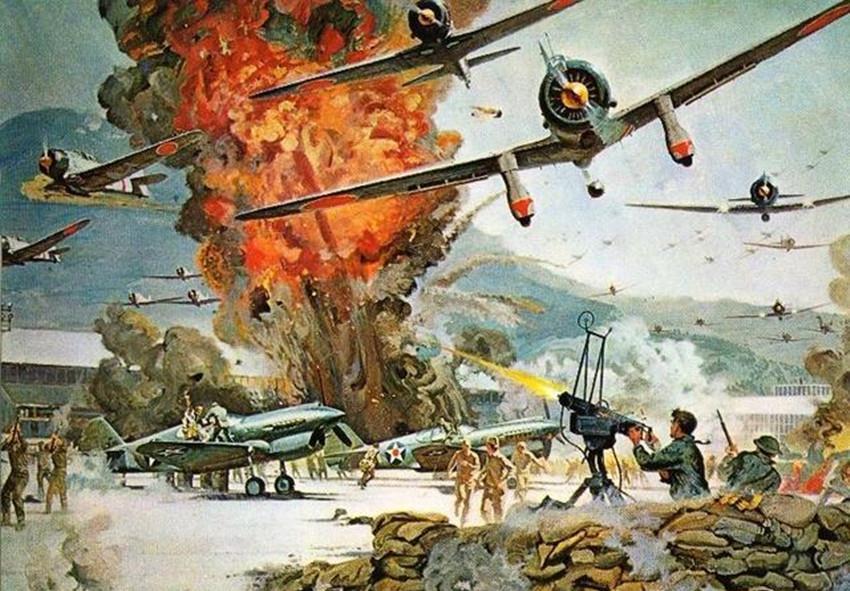We know that at the beginning of World War II, the Japanese army was invincible and invincible, and almost swept through most of Asia. It was not until the outbreak of the Pacific War and the defeat of the two naval battles of Midway and Guadalcanal that the arrogance of the Japanese army was curbed. Subsequently, the Japanese Burmese Front launched the Imphal Campaign against India, which ended in a crushing defeat. This completely reversed the situation in the Asian theater of World War II.

(Network illustration)
Why, then, did Japan end in a fiasco when attacking India and dare not fight again?
Of course, this cannot be said to be how powerful India was, because India was a British colony at that time. Therefore, it can be said that the Japanese army was mainly defeated by the British army.
In fact, in the early stages of the battle, the British army has been in a passive position of being beaten, and Imphal has always been surrounded by the Japanese army. Originally, the Japanese army surrounded the British army, but why did it fail in the end?
Mutaguchi was then the commander of the 15th Army of the Japanese Burmese Front and the Japanese commander of the Battle of Imphal. The order to shell Wanping during the "July 7 Incident" was issued by him, and it was an executioner whose hands were stained with the blood of Chinese people.
In the face of the British army that was on the verge of collapse in Burma, Mutaguchi said that he only needed to carry 20 days of war supplies to encircle the British army from the Rakhine Mountains in Burma, and before the rainy season, he could drive the British out of Imphal.
Mutaguchi's battle plan is like his character. On the surface, it looks like it is full of mountains and rivers, but in the details, it exposes the military quality of rashness and arrogance. For example, for the problem of material transportation in the Rakhine Mountains, he learned from his idol, Genghis Khan in Chinese history, who brought his own grain and grass and used pack animals to transport materials. When the army was short of food, the livestock were eaten. Mutaguchi was proud of his flash of inspiration, and he waited for the good news of victory to come back to Japan and receive the award for his meritorious service.
(Ren Mutaguchi)
On March 8, 1944, the Battle of Imphal officially began. Mutaguchi's forces attacked very fiercely, and soon inflicted heavy sieges on the British 17th Army, which was retreating to Imphal.
The battle went very well. The only thing that frustrated Mutaguchi was the cattle and sheep of his convoy of supplies, who, as soon as the battle began, were frightened by the deafening artillery fire and scattered, running into the primeval forest with the supplies and disappearing without a trace.
On 10 April, the Japanese had surrounded Imphal, briefly attacking just 9 km from Imphal. The British saw that the situation was not good, borrowed dozens of C47 transport aircraft from the United States, and began to airdrop reinforcements and supplies to Imphal. By the end of May, Imphal's Allies numbered in 8 divisions, and numerical superiority had played a role. The Offensive momentum of the Japanese army was suppressed and the attrition increased.
Soon, the fast-forward battle imagined by Mutaguchi Lian became a protracted war, and the Japanese army, which had only brought 20 days of rations, dropped from the initial 5 pairs per meal to 3 pairs, 2 pairs, or even 0.4 pairs. The soldiers were hungry and powerless to fight. The wounded also lacked medical treatment and could not be healed, so they had to lie in the cave and wait for death.
After receiving a request from the commander of the 31st Division, Sato Division, for food supplies, Mutaguchi replied: "The Japanese have been a herbivorous people since ancient times. Surrounded by such a dense jungle, you report a lack of food? What's going on! ”
(Battle of Imphal)
The British army, on the other hand, is completely different. Although it was in a circle of encirclement, it guarded imphal, an Allied logistics base, and not only did not have to worry about ammunition and food, but also cigarettes and sweet wine to enjoy.
After entering May, with the rainy season on, the jungle is full of miasma and mosquitoes, like a steamy green hell. Diseases such as malaria, dysentery, cholera, and typhoid fever began to spread among the Japanese army. Without medicine, soldiers who were suffering from hunger and sickness began to die in the hundreds.
Eventually, the commander of the Japanese 31st Division, Sato Yukitoku, after receiving a reply from Mutaguchi to continue the attack, led his men to retreat on his own, which triggered more Japanese retreats. The British switched from defensive to offensive and began a massive offensive. Not only did it regain lost ground, but it also cut off the japanese army's ties. Faced with a fierce British offensive and a constantly fleeing Japanese army, Mutaguchi had to order a retreat.
In this way, the Battle of Imphal lasted for four months and ended with a crushing defeat for the Japanese army. 100,000 Japanese troops participated in the war, and the death toll reached more than 53,000. Among them, about 30,000 people died of disease and starvation! The more than 40,000 soldiers who survived were either wounded or sick.
The Battle of Imphal was a profound victory for the British army that had routed in Burma. The 15th Army, the main force of the Japanese Burmese Front, was greatly weakened in this battle and was no longer able to launch a campaign to change the pattern. Since then, the Allies have sounded the clarion call of Southeast Asia to counterattack the Japanese army, and the Japanese army has begun to move towards the end.
(Reference: Bloody Rainforest: Battle of Imphal)